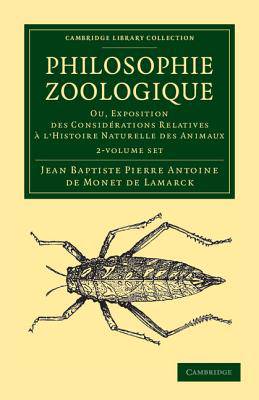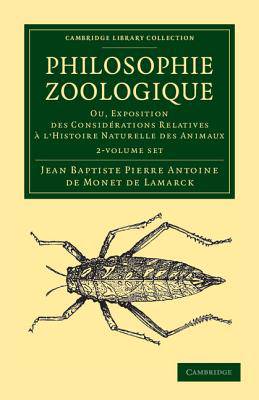
Bedankt voor het vertrouwen het afgelopen jaar! Om jou te bedanken bieden we GRATIS verzending (in België) aan op alles gedurende de hele maand januari.
- Afhalen na 1 uur in een winkel met voorraad
- In januari gratis thuislevering in België
- Ruim aanbod met 7 miljoen producten
Bedankt voor het vertrouwen het afgelopen jaar! Om jou te bedanken bieden we GRATIS verzending (in België) aan op alles gedurende de hele maand januari.
- Afhalen na 1 uur in een winkel met voorraad
- In januari gratis thuislevering in België
- Ruim aanbod met 7 miljoen producten
Zoeken
Philosophie Zoologique 2 Volume Set
Ou Exposition; Des Considerations Relative À l'Histoire Naturelle Des Animaux
Jean Baptiste Pierre Antoine De Monet De Lamarck
€ 90,95
+ 181 punten
Omschrijving
The great French zoologist Lamarck (1744-1829) was best known for his theory of evolution, called 'soft inheritance', whereby organisms pass down acquired characteristics to their offspring. Originally a soldier, Lamarck later studied medicine and biology, becoming particularly interested in botany. His distinguished career included admission to the French Academy of Sciences (1779), and appointments as Royal Botanist (1781) and as professor of zoology at the Musée Nationale d'Histoire Naturelle in 1793. Acknowledged as the premier authority on invertebrate zoology, he is credited with coining the term 'invertebrates'. In this two-volume work of 1809, he outlines his theory that under the pressure of different external circumstances, species can develop variations, and that new species and genera can eventually evolve as a result. Darwin paid tribute to Lamarck as the man who 'first did the eminent service of arousing attention to the probability of all change ... being the result of law'.
Specificaties
Betrokkenen
- Auteur(s):
- Uitgeverij:
Inhoud
- Aantal bladzijden:
- 946
- Taal:
- Frans
- Reeks:
Eigenschappen
- Productcode (EAN):
- 9781108038041
- Verschijningsdatum:
- 3/11/2011
- Uitvoering:
- Boek
- Afmetingen:
- 140 mm x 213 mm
- Gewicht:
- 1224 g

Alleen bij Standaard Boekhandel
+ 181 punten op je klantenkaart van Standaard Boekhandel
Beoordelingen
We publiceren alleen reviews die voldoen aan de voorwaarden voor reviews. Bekijk onze voorwaarden voor reviews.









